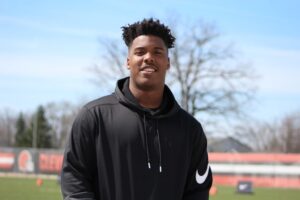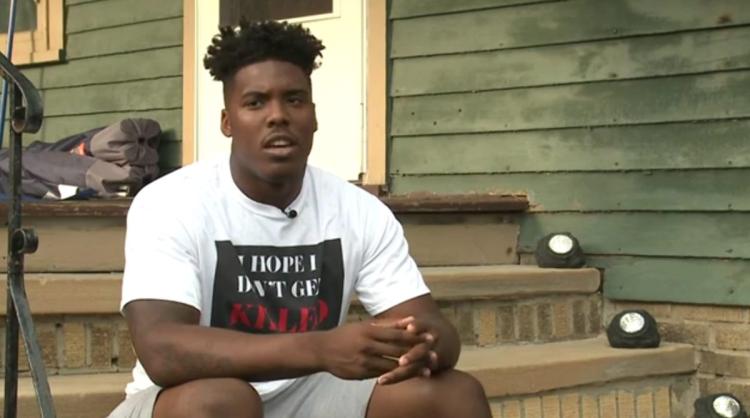Notice: Undefined offset: 1 in /var/www/wp-content/themes/jnews/class/ContentTag.php on line 86
Notice: Undefined offset: 1 in /var/www/wp-content/themes/jnews/class/ContentTag.php on line 86

By Jessica A. Johnson, For The African-American Athlete
“I hope I don’t get killed for being black today.”
This was definitely not the top headline we were expecting from Ohio State’s football camp last week. Yet, this was the bold, socially conscious message that Cleveland Heights’ four-star defensive end Tyreke Smith confidently conveyed on a T-shirt designed by his older brother Malik, a message calling attention to the appalling homicide rates of young African-American males in his community as well as the nation.
It didn’t take long for Tyreke’s shirt to light up social media. He received a lot of support on Twitter, but he also got the expected backlash from college football fans who detest the infusion of social activism in sports. At just 17, Tyreke has shown that he is absolutely “woke” regarding the deadly plight of crime and violence that many of his peers face on a daily basis. If you’re not familiar with the term “woke,” it is an expression defining urban cultural enlightenment for being aware of social injustice and systemic racism and inequality.

In his interview with Eleven Warriors’ Andrew Lind, Tyreke not only discussed police shootings of black men but also addressed other significant disparities in black communities. “I think the biggest reasons (for the crimes) are a lack of parenting, community policing and valuing education,” Tyreke explained to Lind.
Just from reading this quote, it’s probably safe to assume that Tyreke will be taking some urban sociology and education courses at the university where he decides to play football, and it’s encouraging that he wants to use his emerging platform to make a difference. With the Buckeyes and other powerhouse programs such as Georgia, Alabama, Texas, and Michigan recruiting him, Tyreke will certainly have a captive audience.
For those with the “why can’t we leave politics out of sports” attitude, the current strain between law enforcement and communities of color, along with increased calls for criminal justice reform, will only cause more African-American athletes to speak out. Many are refusing to ignore these issues and are using their elite status in professional sports for civic engagement.
Le’Veon Bell, Chris Paul, Jason Richardson, and Colin Kaepernick have all tweeted about high-profile police shootings, including the death of Philando Castile in Saint Paul, Minnesota, last summer. The recent acquittal of the police officer who shot Castile, in addition to officers not being charged in other cases making national news like Cincinnati’s Samuel DuBose, has intensified the debate on police brutality.
Former Buckeye football players Malcolm Jenkins, Chris “Beanie” Wells, and Raekwon McMillan, along with Cleveland Browns’ Ibraheim Campbell, signed a letter addressed to Ohio senators that supports the Targeted Community Alternatives to Prison plan, which advocates for rehabilitation for short-term nonviolent offenders using options such as substance-abuse treatment and mental-health support.
Approximately 57 percent of college football players are African-American, so racial issues concerning “community policing,” as Tyreke mentioned, cannot be sidelined, and it is extremely unfair and unrealistic to expect young black men coming from similar backgrounds not to talk about what they have witnessed growing up.
Ohio State football coach Urban Meyer has created an enriching culture for this type of constructive dialogue with his Real Life Wednesdays program. This year, OSU football tweeted that race was incorporated as a major topic for players to tackle, which will no doubt help them deal with many of the tragedies and sensitive incidents that shape our national discussion. Real life is real hard for many black males, and Tyreke expressed to Lind that seeing “senseless killings” takes a toll. Playing football cannot shield Tyreke from this troubling reality, but it is clear that he is a young visionary who will take advantage of the educational opportunity provided for him due to his athletic talents.
Tyreke Smith showed a lot of courage wearing that shirt to Ohio State’s camp, and he has demonstrated that he has the maturity to handle the message behind it. That’s the intellect you want in a student and the moxie you want in an athlete.
Jessica A. Johnson can be reached at: Johnjohnson.503@osu.edu @JjSmojc
